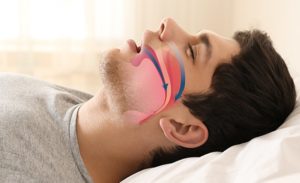THE ORAL-SYSTEMIC LINK (2/3)
July 31, 2023
 If you missed Part 1 of this series, you can find it at www.thetowncommon.com.
If you missed Part 1 of this series, you can find it at www.thetowncommon.com.
I ended last week with a statement that I have used numerous times before – just because it doesn’t hurt doesn’t mean there isn’t a problem. We keep learning more and more about the link between the mouth and the rest of the body. It is essential that dentists and physicians do a better job at co-managing patients, and learn more about the relationship between oral and systemic disease.
It is clear that if you want to take better care of yourself, you need to take better care of your mouth. Familial history is very important. If you know of any family history of dental problems, you are at higher risk. Higher risk individuals need to be treated differently, and may need a more aggressive preventive protocol to help ward off progression of disease. In addition, an otherwise healthy person who presents with a sudden increase in gum inflammation should possibly be evaluated by their physician to rule out any systemic causes if there is not a simple explanation for the change.
Salivary biomarkers are among the tools being researched to help determine the particular disease path that a person is on. Although in their infancy, this precision approach to the prevention and treatment of periodontal disease accounts for variability in a person’s genes, environment, and lifestyle. Because it is more personalized to the individual, it results in more accurate treatment planning, as well as improved outcomes for the patient.
Considering the aging population, periodontal (gum) disease has the potential to become the most prevalent dental disease in the near future. It is more important than ever for dentists to take the time to develop and incorporate a comprehensive periodontal examination and treatment protocol for adults.
As with most diseases, delaying the treatment of periodontal disease until the advanced stages results in treatment that is more expensive, more complex, and less predictable. Most early to moderate stage disease can be treated in a general dental office if the inflammation is easy to control, the patient doesn’t have numerous systemic issues, and is determined to do their part at home. If all these things have been done without resolution, or if the periodontal disease is more severe, it may be in the patient’s best interest to be referred to a like-minded periodontist. A periodontist is a specialist who treats disease of the gums and bone that support the teeth.
When half of the US population is still affected with periodontal disease, despite decades of research and treatments, something is still missing. That missing key is a more collaborative approach involving, dentists, periodontists and physicians.
….and remember, just because it doesn’t hurt doesn’t mean there isn’t a problem. To be continued.
Dr. St. Clair maintains a private dental practice in Rowley dedicated to health-centered family dentistry. He has a special interest in treating snoring, sleep apnea and TMJ problems. If there are certain topics you would like to see written about or questions you have please email them to him at jpstclair@stclairdmd.com
THE ORAL-SYSTEMIC LINK (1/3)
July 24, 2023
The connection between oral health and systemic health is well-established and ever-evolving. One thing we know for certain; we are living longer, but with more chronic diseases and medication than ever before.
The latest statistics are alarming. Forty-seven percent of US adults who are age 30 or older – an estimated 64.7 million Americans – have either mild gum disease (8.7%), moderate gum disease (30%) or severe gum disease (8.5%). As the population ages, the prevalence rises with 70% of individuals over the age of 65 exhibiting some level of gum disease. And, since we are on statistics, by 2030, it is estimated that the number of people over 70 years of age will have doubled from 35 million to 71 million.
So, as we age, our risk of developing disease increases. Interestingly, there is also a direct correlation between the regions of the US with the greatest concentration of gum disease, and those that have a high incidence of cardiovascular disease and diabetes. Although a direct cause-and-effect link is still in the process of being established between gum disease (periodontitis) and other systemic diseases, inflammation is often a common denominator. And it is always important to remember that the mouth is the gateway to the rest of the body.
We used to think that if people didn’t brush their teeth well, or didn’t visit a dentist often, they would automatically get gum disease. However, there are patients who have poor home care who never develop gum disease, and there are also patients who have great home care, visit a dentist regularly, and continue to experience breakdown from gum disease – albeit at a slower rate than they would if they had poor habits.
We now know that managing gum disease and other chronic inflammatory diseases like cardiovascular disease, diabetes, respiratory disease and arthritis are more patient specific based on an individual’s “inflammatory mediators”. These are molecules released by immune cells and are largely responsible for individual responses to disease susceptibility and progression. This is why probiotics are likely to play a significant role in treatment of chronic inflammation in the future.
As we wait for research development for different ways to combat chronic inflammation, it is without dispute that people should do all they can to minimize inflammation in the mouth. The mouth is very accessible and with proper training, coaching and monitoring, a healthy mouth is better for your whole body.
Although some may say that the associations between gum and systemic diseases are statistical by nature, not causal, the data is fairly strong that there is a link between gum disease and cardiovascular disease – such as heart infarction and stroke. This supports diagnosing and treating oral infections, including lifelong professional maintenance and good home care.
Remember – just because it doesn’t hurt doesn’t mean there isn’t a problem. More next week.
Dr. St. Clair maintains a private dental practice in Rowley dedicated to health-centered family dentistry. He has a special interest in treating snoring, sleep apnea and TMJ problems. If there are certain topics you would like to see written about or questions you have please email them to him at jpstclair@stclairdmd.com
IT’S YOUR CHOICE
July 17, 2023
 Our lives are a series of choices. If we feel we don’t have a choice in a particular situation, think again. We usually do have a choice because our actions are based on how we think. How we think is a choice. While not necessarily easy, we can choose to think differently.
Our lives are a series of choices. If we feel we don’t have a choice in a particular situation, think again. We usually do have a choice because our actions are based on how we think. How we think is a choice. While not necessarily easy, we can choose to think differently.
I am going to use dental insurance as an example, since this is supposed to be a dental column. Dentists hear all the time, “My insurance only covers ____”, or “My insurance says they don’t cover that”, or “My insurance company says I can only see a dentist on their list”, or “I can’t do that because I don’t have insurance.” The response that most dentists think, but are usually afraid to say is, “Who is in charge of your dental health, you or your insurance company?”
The first thought you may have when you read this is about money. “If my insurance company doesn’t cover it, I guess I can’t do it.” While you may think you cannot “afford” something, it is a choice. There are varying degrees of dental health. Maybe everyone can’t “afford” optimal care; crowns on teeth that need the protection, esthetic enhancements, replacement of missing teeth, etc., but basic dental care to improve your health is available to everyone. If you are committed to better dental health but have not found that to be true, you are not looking in the right place.
The money barrier to getting the care you need evokes emotions. Emotions in and of themselves have no real value; they are neither good nor bad. They are just sirens alerting us to something we should pay attention to. If we learn to listen to them instead of blindly obeying them, they can be very good teachers. If money evokes a negative emotion when it comes to dental care, it is because you know your dental health is important. You need to make the choice for better dental health, and find the place to help you overcome the barrier of money, or anything else that is holding you back.
I am sure you are aware, especially if you have read these columns over the years, that medical insurance and dental insurance are totally different. Both are broken systems, in my opinion. The fact of the matter is, we (who are ultimately responsible for our own health), have to see it like it is now. We can’t “afford” to wait for politicians and insurance bureaucrats to “figure it out.” Dental insurance has continued to get worse since its inception over 40 years ago. What are we waiting for?
I certainly do not have the answers to fix the problem. While we wait for everything to miraculously change, you have the freedom to choose what is best for you. It would be nice if you had dental insurance that allowed you to go to whoever you wanted, and get the things done that you need (or want) without asking permission from the insurance company. Can you wait for the system to change? Regardless of insurance, whatever is holding you back, you can change the way you think about dental health.
I am sure this column produces different “emotions” for different people. I would love to hear your comments so I can address them in another column.
Dr. St. Clair maintains a private dental practice in Rowley dedicated to health-centered family dentistry. He has a special interest in treating snoring, sleep apnea and TMJ problems. If there are certain topics you would like to see written about or questions you have please email them to him at jpstclair@stclairdmd.com
DENTURE MAINTENANCE
July 10, 2023
 Contrary to what many denture-wearers believe, dentures require regular maintenance, including relines, repairs, and replacement. In fact, the average denture should be relined every two to three years and replaced every five to seven years for the most optimal fitting prosthesis. There are many reasons for this maintenance interval and for regular dental examinations, whether or not the patient perceives any problem.
Contrary to what many denture-wearers believe, dentures require regular maintenance, including relines, repairs, and replacement. In fact, the average denture should be relined every two to three years and replaced every five to seven years for the most optimal fitting prosthesis. There are many reasons for this maintenance interval and for regular dental examinations, whether or not the patient perceives any problem.
The first problem has to do with the basic function of the bone surrounding natural teeth. Natural teeth are held in their sockets by thousands of “cables”, called the periodontal ligament that tug and pull on the supporting bone during function. The bone is designed to be strengthened and stimulated in this manner. When the teeth are removed, the bone no longer has appropriate stimulation, and shrinkage occurs unless it is directly loaded again with dental implants. Bone atrophy is accelerated by inappropriate forces caused by loose and ill-fitting dentures.
Relining, or replacing the tissue surface of the denture, helps preserve bone by adapting dentures to the gums as they shrink, but it is only helpful for dentures that are otherwise in good condition, which includes a proper bite relationship. Relining also helps to encourage health of the soft tissues because dentures plastic is porous and becomes heavily laden with bacteria and yeast over time. Relining refreshes the tissue surface of dentures with new acrylic. Sometimes a more advanced type of relining, called rebasing, is the treatment of choice when all of the pink portion of a denture is in poor condition and needs to be replaced.
New dentures should be made when relining or rebasing of dentures can no longer re-establish proper fit and function. Often this is obvious by wear or fracture of the denture teeth. When dentures contribute to headaches or when the patient’s face begins to look “collapsed” or “old”, the need for new dentures is likely.
Lastly, but certainly not of least importance, denture wearers need to stay current with regular dental examinations for inspection of not only the dentures but the tissue for pre-cancerous lesions. Since most people feel they do not need to go to the dentist once they have dentures, many early pre-cancerous lesions are missed.
Everyone is at risk for oral cancer, whether they have teeth or not. In fact, the constant “trauma” and lack of blood circulation caused by chronic denture wear increases the risk for oral cancer development. For this reason alone, annual dental examinations are recommended for denture wearers.
Many patients with older dentures report their dentures fit fine. You can relate this to the fit of shoes. Shoes get broken in over time and seem comfortable. However, the fact is, over time shoes lose their ability to provide proper support. Even though they may be comfortable, they may be causing other problems due to this lack of support.
If you are a denture wearer and have not seen a dentist in a year or more, it’s time to consider a dental visit. Learn about how your dentures are fitting and whether relining or replacing them makes sense. For most, it is also never too late to consider the benefits of dental implants to help preserve bone and secure dentures in place.
Dr. St. Clair maintains a private dental practice in Rowley dedicated to health-centered family dentistry. He has a special interest in treating snoring, sleep apnea and TMJ problems. If there are certain topics you would like to see written about or questions you have please email them to him at jpstclair@stclairdmd.com
EVERYTHING IS CONNECTED
July 3, 2023
 Disease is defined as, “a disorder of structure or function in a human, animal, or plant, especially one that produces specific signs or symptoms or that affects a specific location and is not simply a direct result of physical injury.” Symptoms are those which are felt and signs are those which are seen. Disease may show signs but no symptoms. Two areas dentists see signs of, often without symptoms, are bruxism (grinding)/clenching and GERD or gastroesophageal reflux disease, causing chemical erosion of the teeth.
Disease is defined as, “a disorder of structure or function in a human, animal, or plant, especially one that produces specific signs or symptoms or that affects a specific location and is not simply a direct result of physical injury.” Symptoms are those which are felt and signs are those which are seen. Disease may show signs but no symptoms. Two areas dentists see signs of, often without symptoms, are bruxism (grinding)/clenching and GERD or gastroesophageal reflux disease, causing chemical erosion of the teeth.
Some people present with symptoms relating to these two issues, but more often than not, people do not have symptoms. Dental patients who present with signs of tooth wear or acid destruction are riskier to treat. Riskier because the “issues” are often times, and maybe even most often, not treated. This is a significant reason for tooth structure breakdown and shorter life-span of dental work.
However, that’s not really what I wanted to highlight in this week’s column. There are many reasons why people have these two issues. Sometimes these problems are preventable with simple lifestyle changes; other times they need more aggressive treatment because they are coming from the central nervous system or related to something else going on in the body. They can also be caused by certain medications.
In today’s world, everyone is being pushed to their limits in just about every aspect that you can imagine. More is demanded with less time to accomplish. All this can become a source of stress, anxiety and even depression.
This “epidemic” spurred the development of newer medications with fewer side effects to help manage these conditions and hence, the SSRIs (selective serotonin reuptake inhibitors) were born in 1988. Since then, recent reports show that the use of the SSRIs (i.e. Paxil, Zoloft, Prozac, Celexa, Effexor, etc.) has increased more than 400 percent!
Dentists see the signs of bruxism or clenching/grinding of the teeth on a regular basis, and some of it is the result of stress and anxiety. But another factor that we have to keep in mind is that patients are now taking more anti-anxiety and antidepressants than ever before in history. It is often overlooked, but the SSRIs and even some of the SSNRIs (Selective Serotonin Norepinephrine Reuptake Inhibitors) often increase bruxism or clenching and grinding effects at night.
This leads to patients having an increased frequency of headaches, jaw pain and other symptoms of clenching/grinding. I have seen many patients who have presented with increased frequency and intensity of symptoms shortly after the patient starts on these medications. I have found that sometimes a change in medication or reduction in the dosage with the help of the prescribing medical doctor can help.
Sleep can also be affected by all this clenching/grinding going on. Again, symptoms may or may not be present. Dental splints, or orthotics, which are custom-made to treat specific issues, are very underutilized. Often times, patients try generic mouthguards or nightguards with poor results. The right appliance, splint, brace, or orthotic, can make all the difference in the world.
You should certainly discuss any symptoms you have with your dentist and physician. If you don’t have any symptoms but your provider can show you evidence of disease, be open to digging deeper to try to determine the underlying cause. Everything is connected.
Dr. St. Clair maintains a private dental practice in Rowley dedicated to health-centered family dentistry. He has a special interest in treating snoring, sleep apnea and TMJ problems. If there are certain topics you would like to see written about or questions you have please email them to him at jpstclair@stclairdmd.com







